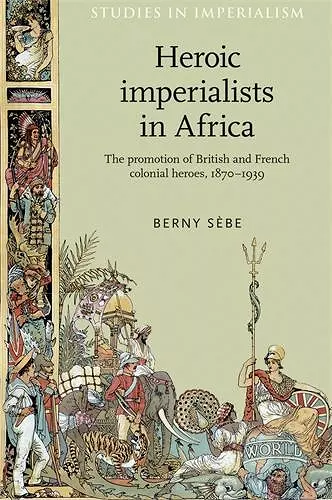Heroic Imperialists in Africa
The Promotion of British and French Colonial Heroes, 1870–1939
Format:Paperback
Publisher:Manchester University Press
Published:1st Apr '15
Currently unavailable, and unfortunately no date known when it will be back

From the height of ‘New Imperialism’ until the Second World War, three generations of heroes of the British and French empires in Africa were selected, manufactured and packaged for consumption by a metropolitan public eager to discover new horizons and to find comfort in the concept of a ‘civilising mission’.
Available in paperback for the first time, this book looks at imperial heroism by examining the legends of a dozen major colonial figures on both sides of the Channel, revisiting the familiar stories of Livingstone, Gordon and Kitchener from a radically new angle, and throwing light on their French counterparts, often less famous in the Anglophone world but certainly equally fascinating.
'In this superbly researched and elegantly written book, Sèbe has opened a vital new chapter in the cultural history of empire, and also helped to explain why it was often so difficult to control headstrong "men on the spot". And by comparing the practices of this "hero-making" industry in Britain and France, he has made an important contribution to the wider scholarship on Europe’s imperialisms.'
John Darwin, University of Oxford
'Essential reading for all students and scholars of colonial history. Sèbe is sensitive to the very different French and British contexts of the individuals he presents, but the overall impact of his study lies in its insightful delineation of the phenomenon of "celebrity colonialism". This book constitutes a timely intervention in debates about the complex interactions between European and African histories.'
Charles Forsdick, University of Liverpool
'Berny Sèbe has written an original and imaginative work. This stimulating and resourceful book penetrates the reality of myth-building in the colonial era.'
Wm. Roger Louis, University of Texas at Austin
'Brilliantly combines the history of mentalities and quantitative history to reveal the mediated nature of, and political alchemy behind, these figures at the heart of the "imperial mindset" of Britain and France.'
Jacques Frémeaux, University of Paris-Sorbonne
‘Undoubtedly a highly significant and elegantly written work.’
Thomas Sharp, Oxford Brookes University, War in History 24 (1)
‘The work is a first-class contribution to understanding, and will hopefully open the way for more such comparative analyses. ‘
John Mullen, University of Rouen, Quaderna
‘The broad temporal perspective and the multiplicity of different imperial heroes analysed make this study both richly detailed and highly pertinent to an array of different scholarly questions and fields. Thus, it should be recommended to students and scholars not only of imperial history, but also of Franco-British relations, French studies, cultural history and the history of popular culture.’
Joanna Warson, University of Portsmouth, The Journal of Imperial and Commonwealth History, May 2014
‘Berny Sèbe has written an excellent comparative account of the rise to prominence
in Britain and France of male colonial figures in the late nineteenth century and their
continued relevance into the interwar years….Sèbe’s book is very good at explaining how the reputations of key imperial figures were established, and on providing the deep context to the creation of national reputations at this time.’
Stephen Heathorn, McMaster University, French History, January 2016
‘Its archival richness and its refreshing reliance on literary history make it not only a balanced, but also a finely textured, interdisciplinary piece of scholarship.’
Priyasha Mukhopadhyay, University of Oxford, Interventions International Journal of Postcolonial Studies, July 2015
‘This book is one of the (too) few attempts at comparing French and British late 19thand early 20th-century imperialisms. The relative scarcity of relevant comparative studies of modern imperialisms is understandable. Such an approach requires both proficiency in two separate national historiographies and knowledge of two very different sets of archival records. Berny Sèbe was able to overcome these obstacles in his detailed study of the development of the imperial hero from the 1870s to the late 1930s without falling into the trap of generalization or mere juxtaposition. This fruitful cultural history of colonialism focuses in particular on the connection between the advent of High Imperialism and the rise of mass culture in the last decades of the 19th century. This work—the culmination of a years-long research project supervised by John G. Darwin—was therefore logically published in ‘Studies in Imperialism’ (Manchester UP). John Mackenzie was the general editor for that series for many years. Sèbe’s examination of colonial heroes owes a great deal to his well-known works on imperial culture.’
Daniel Foliard, Université Paris Ouest Nanterre la Défense, Cahiers victoriens et Édouardiens 82, Autumn 2015
‘This well-researched book is an essential contribution to the history of empire and will be of great use to students and scholars of colonial history.’
Kelsey Suggitt, University of Portsmouth, Modern and Contemporary France March 2016
‘This book is a major addition to reputation studies and to imperial history. The author has clear command over the political contexts in Britain and France from the late nineteenth to the mid-twentieth century: there is much here that will provoke established scholars to think about popular imperialism and imperialist iconsin new ways. But Sèbe’s work is also accessible to those new to the field, offering, for instance, a helpful appendix of short biographies of the keyfigures he discusses. Sèbe paves the way for future research on imperial myth-making, having successfully established the importance of the heroic legend to both British and French imperial culture.’
Justin D.Livingstone, Queen’s University Belfast, HER, 556, October 2017
‘Heroic Imperialistsin Africa stands at the crossroads between imperial, cultural, publishing and even literary history. It opens new perspectives and undoubtedly deserves to be widely read.’
Daniel Follard, Cahiers victoriens et édouardiens, Vol 82, Autumn 2015
ISBN: 9780719097515
Dimensions: 234mm x 156mm x 20mm
Weight: 544g
352 pages